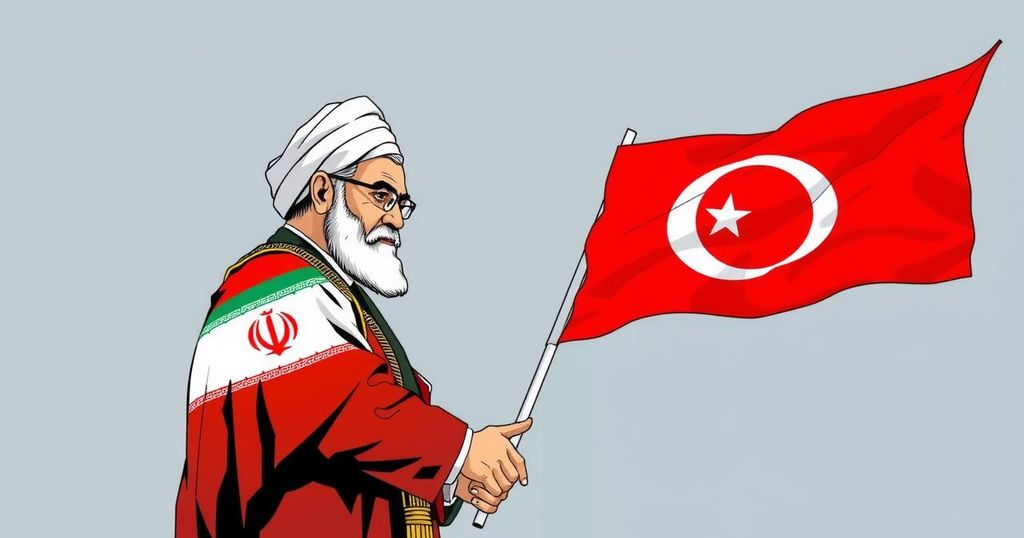Iran and Turkey Solidify Ties Amid Regional Turmoil Post Sinwar’s Death
Following the death of Hamas leader Yahya Sinwar, Iranian Foreign Minister Abbas Araghchi visited Turkey to strengthen ties and support for Hamas and Hezbollah, discussing regional conflicts, particularly in Gaza and Armenia, while both nations oppose Israeli actions.
Following the recent demise of Hamas leader Yahya Sinwar, Iranian Foreign Minister Abbas Araghchi embarked on an official visit to Turkey, which was part of a larger regional diplomatic tour. His itinerary included stops in Lebanon, Syria, Saudi Arabia, Qatar, Iraq, Oman, Jordan, and Egypt, all aimed at reinforcing Iran’s influence throughout the region while working to further isolate Israel. In the aftermath of Sinwar’s death, there is a discernible trend toward greater collaboration between Iran and Turkey in their support of Hamas and Hezbollah, as both nations find common ground in opposing Israeli actions. Iranian state media highlighted Araghchi’s statement warning against a potential escalation of warfare in the region, emphasizing a shared acknowledgment of the ongoing conflicts in Gaza and Lebanon and their repercussions for displaced populations. Araghchi attended a South Caucasus regional conference, where he simultaneously criticized Israel, promoting a unified front between Iran and Turkey. During his Istanbul visit, he underscored the urgent need for discussion regarding Israeli aggression, which he claims escalates the precarious state of the region. Over the past decade, ties between Tehran and Ankara have intensified, despite some divergences on specific issues, especially as both countries maintain cordial relations with Qatar, a host to Hamas leadership. In addition to their engagement in Palestinian causes, Turkey and Iran are also deliberating current developments involving Azerbaijan, Armenia, and Russia. Traditionally, Turkey has fostered strong connections with Azerbaijan, whereas Iran maintains cordial relations with Armenia. Russia, playing a multifaceted role, has established cooperative partnerships with both Tehran and Ankara, having observed Azerbaijan’s recent military advances against Armenia concerning Nagorno-Karabakh. Turkey’s foreign minister Hakan Fidan has increasingly adopted a confrontational stance towards Israel over the past year. Turkish President Recep Tayyip Erdogan has notably wielded vehement rhetoric against Israeli policies, further signaling a shift in regional alliances.
The geopolitical landscape in the Middle East has been heavily influenced by the dynamics between Iran and Turkey, particularly in the context of their respective support for groups such as Hamas and Hezbollah. Following the death of a significant Hamas leader, Yahya Sinwar, the relationship between these two countries has gained heightened scrutiny as they navigate their roles in regional conflicts, especially concerning Israel. The historical context of Turkish-Iranian relations and their shared interests, including their ties with Qatar, provide a framework for understanding their cooperation amidst the tumultuous backdrop of Middle Eastern politics.
In conclusion, the death of Yahya Sinwar has galvanized a closer partnership between Iran and Turkey, as both nations actively work to bolster their support for Hamas and Hezbollah while simultaneously addressing escalating tensions with Israel. Their ongoing diplomatic endeavors reflect a strategic alignment that may redefine regional alliances and influence future conflict dynamics. As Turkey navigates its relations with Azerbaijan and Armenia, and Iran reinforces its connections with various regional actors, the trajectory of their collaboration will be pivotal in shaping the landscape of Middle Eastern politics.
Original Source: www.jpost.com




Post Comment